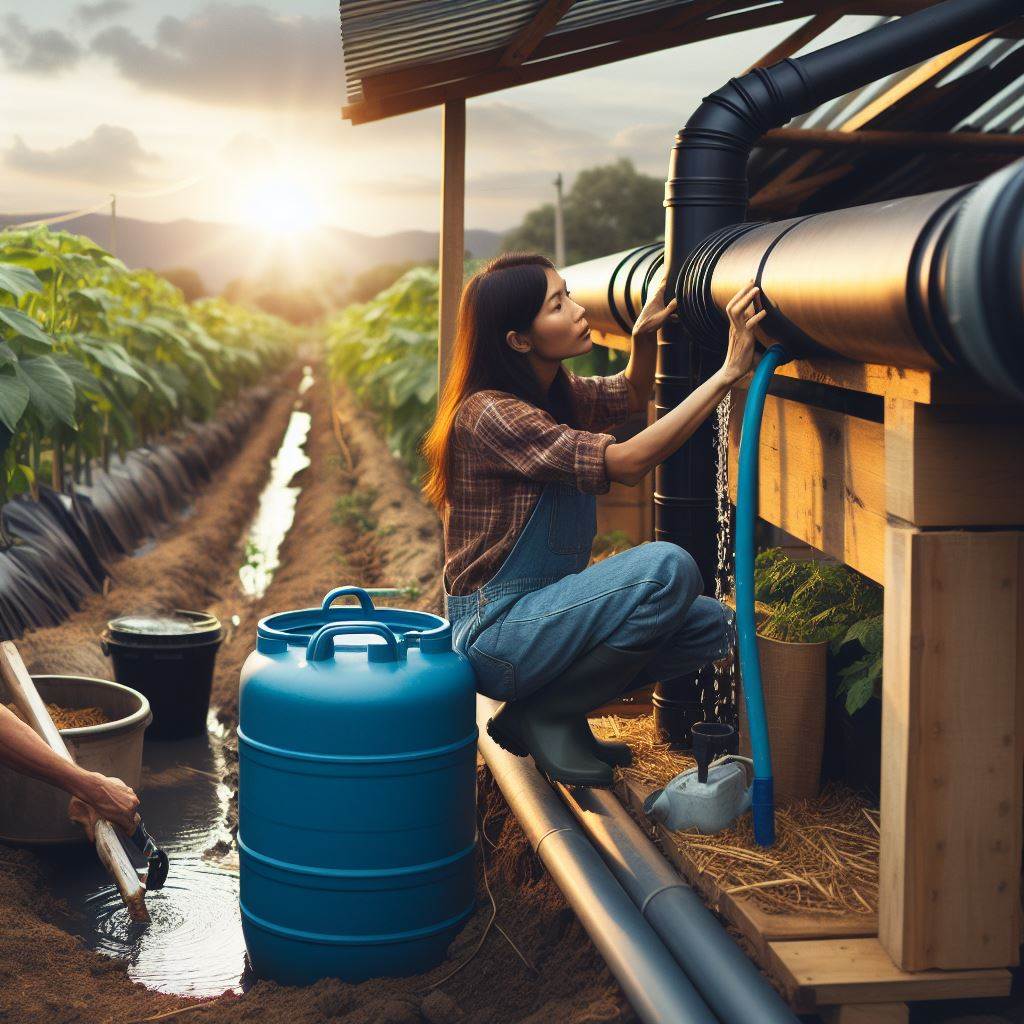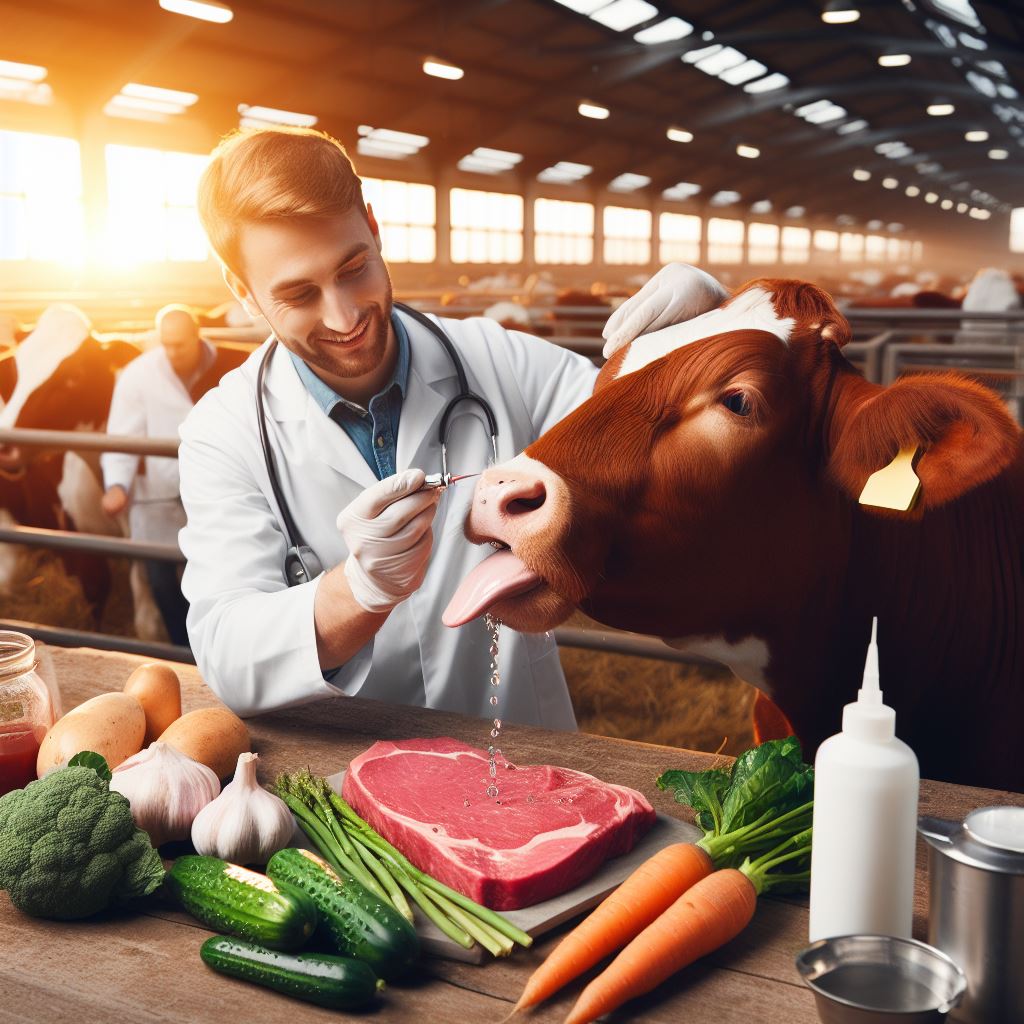Introduction
Importance of water management in grazing fields
Water management in grazing fields is crucial for the health and productivity of livestock.
Adequate water availability is essential for their well-being and proper functioning.
In this blog section, we will discuss the importance of water management in grazing fields and its impact on livestock.
Effective water management ensures that livestock have access to clean and sufficient water sources.
This is vital for their hydration, digestion, and overall health.
Water scarcity or contamination can lead to various health issues and reduced productivity in animals.
Impact of water availability on the health and productivity of livestock
The availability of water directly affects the grazing patterns and productivity of livestock.
If water sources are far from grazing areas, animals have to travel long distances, impacting their energy levels and grazing time.
This can lead to weight loss, reduced milk production, and slower growth rates.
Furthermore, inadequate water management poses risks of waterborne diseases and parasites.
Contaminated water sources can transmit diseases to the livestock, affecting their well-being and increasing mortality rates.
Proper management practices such as regular water testing, cleaning of troughs, and providing clean water can mitigate these risks.
Brief overview of the main points to be discussed
In this blog section, we will delve into the various techniques and strategies for efficient water management in grazing fields.
We will explore the benefits of adequate water availability, proper infrastructure, and decision-making processes.
Additionally, we will discuss the importance of monitoring water intake and maintaining water quality.
Transform Your Agribusiness
Unlock your farm's potential with expert advice tailored to your needs. Get actionable steps that drive real results.
Get StartedOverall, understanding the significance of water management in grazing fields and implementing effective measures is essential for ensuring the health and productivity of livestock.
By prioritizing water availability and quality, we can create a sustainable and thriving environment for our animals.
Understanding water requirements in grazing fields
Different factors influencing water needs (temperature, vegetation types, animal type, etc.)
In order to effectively manage water in grazing fields, it is important to understand the factors that influence water requirements.
These factors include:
- Temperature: In hot climates, animals require more water to regulate their body temperature and prevent dehydration.
- Vegetation types: Different types of vegetation have varying water content. Animals grazing on dry, arid grasslands may need more water compared to those grazing on lush, green pastures.
- Animal type: Different animals have different water requirements based on their size, metabolism, and activity level. For example, larger animals like cattle require more water than smaller animals like sheep.
Calculating the water demand per animal unit
To determine the water demand per animal unit, certain calculations can be used.
These calculations take into account the water requirements for each animal based on their weight and activity level.
It is crucial to accurately calculate water demand to ensure sufficient supply.
Assessing available water sources within grazing fields
In order to manage water effectively in grazing fields, it is important to assess and identify the available water sources.
These may include natural sources such as rivers, streams, or ponds, as well as man-made sources like watering troughs or tanks.
The availability, accessibility, and quality of these sources should be considered.
Importance of adequate water supply for proper hydration and digestion
Adequate water supply is crucial for the health and well-being of animals in grazing fields.
Water plays a vital role in maintaining proper hydration levels, aiding in digestion, and ensuring the optimal functioning of various bodily processes.
Insufficient water supply can lead to dehydration, decreased productivity, and overall poor animal health.
Without enough water, animals may struggle to maintain body temperature, leading to heat stress and reduced performance.
Moreover, water is essential for the proper breakdown and absorption of nutrients from food, which is crucial for animal growth and development.
Therefore, understanding the water requirements in grazing fields is essential for effective water management.
Various factors such as temperature, vegetation types, and animal type influence the water needs of animals.
Calculating the water demand per animal unit and assessing available water sources within grazing fields are important steps in ensuring sufficient water supply.
Adequate water supply is crucial for proper hydration and digestion, leading to healthier and more productive animals in grazing fields.
Read: Pest Control in Healthy Pastures

Best practices in water management
Water is a crucial resource in grazing fields, and effective water management practices greatly contribute to the overall success and sustainability of livestock operations.
In this section, we will discuss the best practices for water management, including designing and implementing watering systems, managing water quality, and considering water storage options.
Designing and implementing watering systems
Designing and implementing appropriate watering systems is essential for ensuring a constant and adequate water supply for livestock.
When selecting a watering system, several factors need to be taken into consideration, including cost, maintenance requirements, and environmental impact.
Showcase Your Farming Business
Publish your professional farming services profile on our blog for a one-time fee of $200 and reach a dedicated audience of farmers and agribusiness owners.
Publish Your ProfileDifferent types of systems, such as tanks, troughs, and pipelines, should also be assessed to determine the best fit for the specific grazing area.
Furthermore, strategic placement of watering points should be considered to provide optimal access for livestock and reduce the risk of overcrowding and disputes.
Managing water quality
Maintaining high water quality is crucial for livestock health and productivity.
Regularly testing water sources for purity and safety is necessary to identify any potential contaminants that could harm the animals.
It is also important to implement preventive measures, such as fencing off water sources and controlling runoff, to prevent water contamination from external sources.
In cases where water quality is compromised, appropriate treatment and purification methods should be employed to ensure the water meets the necessary standards.
Water storage considerations
Water storage is vital in grazing fields, particularly during emergencies or dry seasons when water availability may be limited.
Having adequate storage options allows livestock managers to ensure a constant water supply, even during periods of drought or when natural water sources are scarce.
Ponds, tanks, and reservoirs are common types of water storage facilities that can be utilized.
Regular maintenance and management of these facilities are essential to prevent leaks, ensure water quality, and maximize their effectiveness in water conservation.
Implementing best practices in water management is essential for the successful operation and sustainability of grazing fields.
Designing and implementing appropriate watering systems, managing water quality, and considering water storage options are key factors to ensure a constant and reliable water supply for livestock.
By prioritizing these practices, livestock managers can support the health and productivity of their animals while mitigating environmental risks and promoting sustainable water management in grazing fields.
Read: Maximizing Grass Growth in Pastures
Managing water usage efficiently
In order to effectively manage water in grazing fields, it is crucial to focus on efficient water usage.
By implementing water conservation practices and closely monitoring water consumption, farmers can ensure sustainable water management.
Implementing water conservation practices
- Proper pasture rotation helps limit overgrazing and reduces water demand. Rotating livestock between different pastures allows grass to recover and reduces the need for additional watering.
- Implementing water-saving technologies such as automated systems and timers can significantly reduce water wastage. These technologies ensure that water is only used when necessary and can be programmed to optimize watering schedules.
- Utilizing rainwater harvesting techniques is another effective way to conserve water. Collecting and storing rainwater can provide an additional water source for grazing fields, reducing the reliance on freshwater supplies.
Monitoring and controlling water usage
- Regularly measuring and recording water consumption is essential to understand water usage patterns. By keeping accurate records, farmers can identify excessive or unnecessary water usage and take corrective measures.
- Detecting and addressing leaks, wastage, or inefficient systems is crucial in preventing water losses. Regular inspections should be conducted to identify any leaks or faulty equipment that may lead to water wastage.
- Establishing water usage goals and implementing strategies to achieve them is important for efficient water management. By setting targets for water usage reduction and implementing appropriate strategies, farmers can track progress and ensure continuous improvement.
Efficient water management in grazing fields not only conserves this valuable resource but also has numerous benefits.
It helps maintain healthy pastures, reduces costs associated with water consumption, and minimizes environmental impacts.
By prioritizing water conservation practices and actively monitoring water usage, farmers can contribute to sustainable agriculture and ensure long-term water availability.
Read: Balancing Pasture Nutrition Needs
Discover More: Aquaculture Genetics: Better Fish Breeding
Addressing challenges and common issues
Dealing with Drought Conditions
During droughts, water conservation is paramount.
Install water-saving devices and collect rainwater.
Implement efficient irrigation techniques to sustain livestock.
In emergencies, prioritize livestock hydration.
Provide alternative water sources and offer electrolyte supplements for quick hydration.
Controlling Erosion and Runoff in Grazing Fields
Combat erosion by employing effective measures like terracing and establishing buffer zones with native vegetation.
Properly manage vegetative cover through rotational grazing and planting cover crops.
Utilize natural or constructed waterways to control runoff.
Implement natural swales to channel water and constructed waterways to direct flow effectively.
Preventing Waterborne Diseases in Livestock
Safeguard livestock health through regular vaccinations and proactive healthcare measures.
Monitor and promptly treat potential illnesses to ensure a healthy herd.
Proper waste management is crucial to prevent water contamination.
Dispose of animal waste responsibly and establish designated manure management areas for effective waste control.
Effectively managing water in grazing fields demands proactive solutions.
During droughts, conserve water with innovative strategies and ensure emergency hydration for livestock.
Combat erosion by implementing measures like terracing and buffer zones, while maintaining vegetative cover to prevent soil erosion.
Utilize natural or constructed waterways for effective runoff control.
Preventing waterborne diseases requires a two-pronged approach: prioritize vaccinations and implement preventive healthcare measures.
Manage waste effectively to prevent water contamination, ensuring the health and well-being of both livestock and the grazing environment.
Showcase Your Farming Business
Publish your professional farming services profile on our blog for a one-time fee of $200 and reach a dedicated audience of farmers and agribusiness owners.
Publish Your ProfileIn short, tackling water management challenges is crucial for sustainable grazing.
Implement these strategies to overcome hurdles and promote a healthy, well-maintained grazing environment.
Read: Egg Production: Boosting Quality & Quantity
Conclusion
Summary of Key Points Discussed
- Drought Strategies: Conserve water with devices, rainwater collection, and efficient irrigation during drought periods.
- Erosion Control: Implement terracing, buffer zones, and proper vegetative cover for effective erosion management.
- Livestock Health: Prioritize vaccinations, proactive healthcare, and proper waste management to prevent waterborne diseases.
Importance of Effective Water Management
- Livestock Well-Being: Effective water management is pivotal for sustaining livestock health and promoting overall well-being.
- Environmental Impact: Sustainable water practices contribute to a healthy grazing environment and prevent long-term environmental degradation.
Encouragement for Readers to Implement Sustainable Water Management Practices
- Take Action: Implement innovative water conservation and runoff control strategies for sustainable grazing fields.
- Improve Livestock Productivity: Prioritize water management for enhanced livestock health, productivity, and a thriving agricultural landscape.
Readers, embrace sustainable water management.
It’s the key to robust livestock health and increased productivity.
Let’s cultivate a future where responsible water practices define successful grazing fields.




